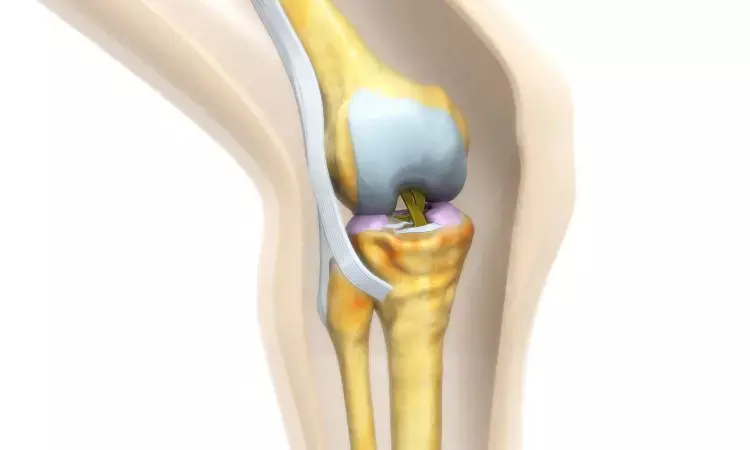- Home
- Medical news & Guidelines
- Anesthesiology
- Cardiology and CTVS
- Critical Care
- Dentistry
- Dermatology
- Diabetes and Endocrinology
- ENT
- Gastroenterology
- Medicine
- Nephrology
- Neurology
- Obstretics-Gynaecology
- Oncology
- Ophthalmology
- Orthopaedics
- Pediatrics-Neonatology
- Psychiatry
- Pulmonology
- Radiology
- Surgery
- Urology
- Laboratory Medicine
- Diet
- Nursing
- Paramedical
- Physiotherapy
- Health news
- Fact Check
- Bone Health Fact Check
- Brain Health Fact Check
- Cancer Related Fact Check
- Child Care Fact Check
- Dental and oral health fact check
- Diabetes and metabolic health fact check
- Diet and Nutrition Fact Check
- Eye and ENT Care Fact Check
- Fitness fact check
- Gut health fact check
- Heart health fact check
- Kidney health fact check
- Medical education fact check
- Men's health fact check
- Respiratory fact check
- Skin and hair care fact check
- Vaccine and Immunization fact check
- Women's health fact check
- AYUSH
- State News
- Andaman and Nicobar Islands
- Andhra Pradesh
- Arunachal Pradesh
- Assam
- Bihar
- Chandigarh
- Chattisgarh
- Dadra and Nagar Haveli
- Daman and Diu
- Delhi
- Goa
- Gujarat
- Haryana
- Himachal Pradesh
- Jammu & Kashmir
- Jharkhand
- Karnataka
- Kerala
- Ladakh
- Lakshadweep
- Madhya Pradesh
- Maharashtra
- Manipur
- Meghalaya
- Mizoram
- Nagaland
- Odisha
- Puducherry
- Punjab
- Rajasthan
- Sikkim
- Tamil Nadu
- Telangana
- Tripura
- Uttar Pradesh
- Uttrakhand
- West Bengal
- Medical Education
- Industry
Newer design of knee replacements not superior to older models, study finds

Older knee replacement designs are just as effective as newer models.
UK: A recent study from the Norfolk and Norwich University Hospital and the University of East Anglia determined if a newer design of total knee replacement (TKR) (Journey II BCS) gives superior patient-reported biomechanical outcomes and outcomes scores.
Results published in the journal BMJ Open did not support the hypothesis that the Journey II BCS produces a better outcome than the Genesis II for the primary outcome of the OKS six months after surgery. The study compared the effectiveness of two established knee replacements. Iain Mcnamara, Consultant Orthopaedic Surgeon at NNUH and an honorary professor at UEA, led the research.
Eighty osteoarthritis patients received total knee replacements in 2018 and 2019 and took part in the CAPAbility study - a blinded, randomised, controlled trial run by researchers at NNUH and UEA.
Dr. Mcnamara said: “The lack of difference between implant designs is important for patients, surgeons, healthcare providers and implant companies.
“For the patient and surgeons, reassurance can be gained that older designs, with a proven track record of function and survivorship, can provide the same patient-reported and functional outcome as more modern designs."
The study is the largest published total knee replacement comparison to date, and patients will be reviewed three and five years after surgery.
Prof Mcnamara said: “For healthcare providers, older implants are often less expensive and, in the absence of clinical benefit with demonstrable longevity, the additional expenditure on more modern designs could be avoided.
“The future of design and innovation may come in the form of more modern surgical techniques such as robotic-assisted implantation to assist in placing the knee in a more kinematically sympathetic position which in turn may allow the newer design philosophies to positively influence the outcome.”
The team are planning future research looking at the effectiveness of robotic technology in knee replacement surgery.
Reference:
McNamara I, Pomeroy V, Clark AB, et alComparison of the Journey II bicruciate stabilised (JII-BCS) and GENESIS II total knee arthroplasty for functional ability and motor impairment: the CAPAbility, blinded, randomised controlled trial BMJ Open 2023;13:e061648. doi: 10.1136/bmjopen-2022-061648
Dr Kamal Kant Kohli-MBBS, DTCD- a chest specialist with more than 30 years of practice and a flair for writing clinical articles, Dr Kamal Kant Kohli joined Medical Dialogues as a Chief Editor of Medical News. Besides writing articles, as an editor, he proofreads and verifies all the medical content published on Medical Dialogues including those coming from journals, studies,medical conferences,guidelines etc. Email: drkohli@medicaldialogues.in. Contact no. 011-43720751


